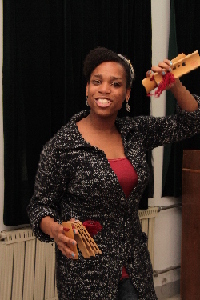Daily life
Going Deeper than Ni Hao
By Parker Barriball (Tianjin Today)
Updated: 2012-05-08
Chances are if you are reading this that you did not come to China to learn Chinese. If you did you are a student, so what are you doing picking up strange magazines in Western bars, go back to studying. What I am getting at is that most of us come to China for reasons other than a love of the language and culture. But there are Westerners among us who get excited and engaged with learning, beyond the nihao and xiexie stages of Chinese and truly have an appreciation for the culture in which we now live. One such foreigner is Marsha Louis.
Marsha is an undergraduate at Nankai University and while not majoring in Chinese she has developed a love for experiencing both the language and culture of China. Marsha hails from Boston MA originally but attends the University of South Florida. She is very much involved with learning and engaging the culture on a level that many foreign students do not attain. We sat down with Marsha to find her motivation for such a difficult endeavor as learning Chinese.
Q. What was your original inspiration to come to China?
A. It's simple really; in fact my mother might even say it was a fickle choice. I saw the opening ceremony of the Beijing Olympics produced by director Zhang Yimou (Flowers of War) and I didn't know it at the time but he has become my favorite director. I always enjoyed learning languages and I wanted to study a foreign language, but up to that point had not decided on which one. Until 2008 I was never that interested in the culture, I didn't have Chinese friends, I didn't eat Chinese food, didn't watch Chinese movies but I watched the opening ceremony and made the decision on that. I knew then that I wanted to study Chinese. I have been here for almost a year and have loved it. My home university, USF has a Confucius institute and we have good cooperation with Nankai University, so here I am.
Marsha doesn't just hit the books and study in the typical fashion. She is an accomplished crosstalk performer as well as the kuai ban. For those of you unfamiliar with these performing arts they involve a lot of talking at a high rate of speed with rhythm being a key skill. The thing to remember is that these traditional Chinese arts are not things one can pick up on the fly after a few Chinese lessons.
Q. Could you give us a rundown of your performances in China?
A. At one point I went to Nanjing to record a TV show, feichang liaode. After the TV appearance I have had a ton of interviews in local media. Even though I think am pretty bad at the kuai ban, Chinese people see foreigners making the attempt and think it's great. Through my university, I was entered in a Foreigner Speaking competition in Tianjin, and won. That was my second time on TV for kuai ban and since then it's been nonstop interviews and interest. I even did a xiang sheng performance in Nanjing. Of course the university has tons of opportunities for things like singing contests and talent shows for students. I like to stay involved with it. And of course I love karaoke.
Q. You seem to be very interested, and adept in Chinese performing arts. That's not the normal route for many students of Chinese. How did you get interested in this side of the culture?
A. Our Chinese program was just starting up when I started classes, but we had Eric Shepard, one of the best Chinese professors in the country, help to build our program. I spent two summers in Qingdao and loved the area. I had the chance to be a TA in Qingdao as well. My teachers in the states would push us to 'fail at a higher level', and always pushed us and used the performing arts as a teaching method. My teacher was proficient in the performing arts and had such a passion for it. He's been a big influence on why I love China so much. He spent the 90's in China with a local family, so he's pretty adept at the traditional arts. He even studied under a master in the master's home as his disciple, it was very traditional education. Shandong is a traditional part of China and that comes through in how he taught us.
Marsha admits that there are plenty of cultural and historical nuances in the xiansheng performances that she does not always catch, but treats it as an opportunity to study and ask friends to explain the culture and history behind the performances. It's a very engaged method of study and one that would be nearly impossible studying anywhere but China.
Marsha said she was surprised by the kid gloves that are still used with her and her classmates, even pointing out that it seems you can push back a mid-term because of a hangnail. While she may enjoy a little more patience and understanding from the teaching staff, I am sure that her Chinese counter parts would disagree.
Q. You are going back to the States soon, what are you plans regarding Chinese and your career plans?
A. I have three plans for the future. I'll be graduating at a strange time, December. I will be applying at American law and graduate schools as well as Chinese graduate schools. My ultimate goal since age eight was to be a lawyer. I love Chinese so much now that I want to incorporate that into my dream, perhaps international Business Law. I would like to go to Harvard Law because it would allow me to study for a time in Shanghai. I would love to eventually work for an American company in China, or at the least one that would allow me to travel back and forth. And if none of that works out at all there's always the option to go into government work.
Q. What would you like to accomplish before leaving? What's one thing you would change about your time here?
I want to master a one-person xiangsheng, which is a 5-10 minute performance. I also want to see Kunming or Inner Mongolia before I go back. I would like to see the desert in China. I am not the model student so I wish I would have spent more time studying with my language partner.
It's obvious that Marsha's interest in the performing arts of China go deeper than a class assignment or a grade. She's really delved into the culture and language simultaneously. We all have similar opportunities to do the same thing, maybe not at the college level, but we live in the culture and even if you don't speak the language I highly doubt anyone reading this has zero Chinese friends they could ask to help them learn more about not only the Chinese language but the culture that comes with it. Ask most Chinese, especially the older generations, and they will beam as they explain China's historical significance to the world. Stick around long enough and you may just improve your Chinese and understand the place in which you live. Not many modern countries can trace their roots as far back as the Chinese. It's a history as long as it is complicated and one that will never leave a student with a lack of material to study and understand. Marsha enjoys diving into Chinese culture and language, maybe you would too.


